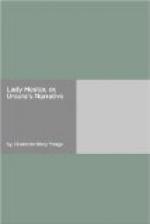It is not fair to say we. It was only myself—Jaquetta never saw anything but kindness, and took it pleasantly, and Fulk was too busy and too unhappy to be concerned about our visiting matters. If I saw anyone coming to call I hid myself in the orchard, or if I was taken by surprise I was stiffness itself; and then I wrote a set of cards (Miss Torwood and Miss Jaquetta Torwood), and drove round in the queer old-fashioned gig to leave them, and there was an end of it; for I would accept no invitations, though Jaquetta looked at me wistfully. And thus I daunted all but old Miss Prior. Poor old thing! All her pleasures had oozed down from our house in old times to her; and her gratitude was indomitable, and stood all imaginable rebuffs that courtesy permitted me. I believe she only pitied and loved me the more, and persevered in the dreadful kindness that has no tact.
It did not strike me that pleasure might be good for Jaquetta, or that Fulk’s stern silent sorrow might have been lightened by variety. Used as he had been to political life and London society, it was no small change to have merely the market for interest, the farm for occupation, and no society but ourselves; no newspaper but the County Chronicle once a week; no new books, for Mudie did not exist then, even if we could have afforded it. We had dropped out of the guinea country book club, and Knight’s “Penny Magazine” was our only fresh literature. However, Jaquetta never was much of a reader, and was full of business—queen of the poultry, and running after the weakly ones half the day, supplementing George Sisson’s very inadequate gardening—aye, and his wife’s equally rough cooking. She found a receipt book, and turned out excellent dishes. She could not bear, she said, to see Fulk try to eat grease, and with an effort at concealment, assisted by the dogs, fall back upon bread and cheese.
Luckily plain work in the school-room had not gone out in our day, and I could make and mend respectably, but I had to keep a volume of Shakespeare, Scott, or Wordsworth open before me, and learn it by heart, to keep away thoughts, which might have been good for me; but no—they were working on their own bitterness.
Sunday was the hardest day of all to Fulk, for this was the only one on which he could not be busy enough to tire himself out. We were a mile from church, and when we got to the worm-eaten farm pew there was a smell, as Jaquey said, as if generations of farmers had been eating cheese there, and generations of mice eating after them; and she always longed to shut up a cat there.
The old curate was very old, and nothing seemed alive but the fiddles in the gallery—indeed, after the “Penny Magazine” had made us acquainted with the Nibelung, Jaquey took to calling Sisson, Folker the mighty fiddler, so determined were his strains.
After the great house was shut up, one service was dropped, and so the latter part of the day was spent in a visit to all the livestock, Fulk laden with Alured, and Jaquetta with tit bits for each and all.




